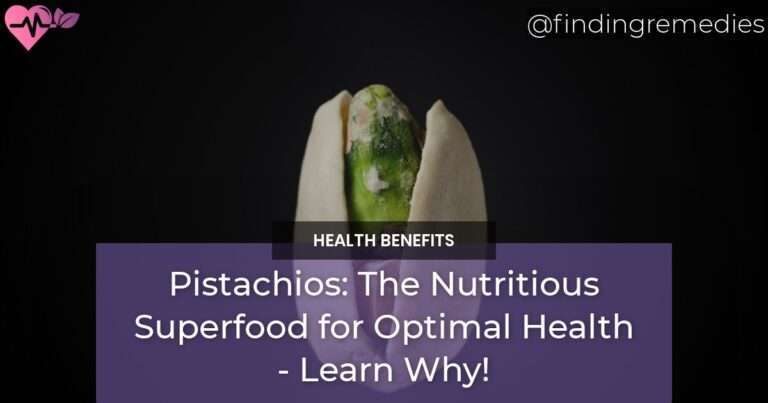Are you looking for a delicious, nutritious snack that can help improve your overall health and wellness? Look no further than pistachios! This superfood is packed with vitamins and minerals that can help promote optimal health, including reducing your risk for chronic diseases.
In this article, we’ll explore why pistachios are so beneficial for your health and how you can add them to your diet. So, if you’re ready to learn more about the health benefits of pistachios, keep reading!
Table of Contents
Pistachio Nutrition Profile
Pistachio Nutrients
Pistachios are nutrient-dense nuts that provide a range of essential vitamins, minerals, and macronutrients. These include healthy fats, protein, fiber, vitamin B6, potassium, magnesium, iron, zinc, and selenium.
Pistachio Nutrient Content
One ounce (28 grams) of pistachios contains:
- Calories: 159
- Protein: 6 grams
- Fat: 13 grams (healthy fats)
- Carbs: 8 grams
- Fiber: 3 grams
- Sugar: 2 grams
Pistachio Nutritional Facts
Pistachios are low in calories and high in fiber, making them a great snack for weight management. They also have a low glycemic index, which means they don’t cause a rapid spike in blood sugar levels. Pistachios are a good source of healthy fats, which can help reduce bad cholesterol levels and lower the risk of heart disease.
Health Benefits of Pistachios
Antioxidant Properties
Pistachios are rich in antioxidants, which help protect cells from damage caused by free radicals. Antioxidants can also reduce inflammation in the body, which is linked to many chronic diseases.
Anti-inflammatory Properties
The anti-inflammatory properties of pistachios can help reduce the risk of chronic diseases such as heart disease, diabetes, and cancer.
Weight Management
Pistachios are a great snack for weight management because they are low in calories and high in protein and fiber. Studies have shown that consuming pistachios can help reduce hunger and promote feelings of fullness.
Cardiovascular Health
Pistachios are rich in healthy fats, particularly monounsaturated and polyunsaturated fatty acids, which can help reduce bad cholesterol levels and lower the risk of heart disease.
Blood Glucose Management
The low glycemic index of pistachios means they don’t cause a rapid spike in blood sugar levels. This makes them a good snack option for people with diabetes.
Digestive Health
Pistachios are a good source of fiber, which can promote digestive health and reduce the risk of constipation.
Immune System Function
Pistachios contain a range of essential vitamins and minerals that are important for immune system function. These include vitamin B6, potassium, and magnesium.
Natural Compounds in Pistachios
Carotenoids
Pistachios are a good source of carotenoids, which have antioxidant properties and can help reduce the risk of chronic diseases.
Phenolic Compounds
Phenolic compounds in pistachios have anti-inflammatory properties and can help reduce the risk of chronic diseases.
Phytosterols
Phytosterols in pistachios can help lower bad cholesterol levels and reduce the risk of heart disease.
Fiber
Fiber in pistachios promotes digestive health and can help reduce the risk of constipation.
Monounsaturated and Polyunsaturated Fatty Acids
Healthy fats in pistachios can help reduce bad cholesterol levels and lower the risk of heart disease.
Effects of Cooking and Proper Storage
Pistachios and Heat Exposure
Exposure to heat can reduce the nutrient content of pistachios. It’s best to store pistachios in a cool, dry place to preserve their nutrient content.
Pistachios and Storage
Pistachios should be stored in an airtight container to prevent them from going stale. They can be stored in the refrigerator or freezer to extend their shelf life.
Risk Factors and Healing Diseases
Pistachios and Allergies
Pistachios can cause allergic reactions in some people. If you have a pistachio allergy, it’s important to avoid them.
Pistachios and Weight Gain
While pistachios are a healthy snack option, consuming too many can contribute to weight gain. It’s important to consume them in moderation as part of a balanced diet.
Pistachios and Diabetes
Pistachios have a low glycemic index, which makes them a good snack option for people with diabetes. However, it’s important to consume them in moderation as part of a balanced diet.
Pistachios and Heart Disease
The healthy fats in pistachios can help reduce bad cholesterol levels and lower the risk of heart disease.
Pistachios and Cancer
Studies have shown that the antioxidants and anti-inflammatory properties of pistachios can help reduce the risk of cancer.
Varieties and Types of Pistachios
Pistachio Varieties
There are many varieties of pistachios, including Kerman, Larnaka, and Red Aleppo.
Roasted vs. Raw Pistachios
Roasted pistachios are crunchy and flavorful, while raw pistachios have a milder taste. Both varieties are healthy options.
Salted vs. Unsalted Pistachios
While salted pistachios are a tasty snack, they can contribute to high blood pressure. Unsalted pistachios are a healthier option.
Disadvantages and Advantages of Pistachios
Pistachios and Weight Management
Pistachios are a great snack for weight management because they are low in calories and high in protein and fiber.
Pistachios and Dental Health
Pistachios can help promote dental health because they require chewing, which can help clean teeth and stimulate saliva production.
Pistachios and Cost
While pistachios can be more expensive than other nuts, they are a healthy and nutritious snack option.
Conclusion
Pistachios are a nutrient-dense snack that provide a range of health benefits. They are rich in antioxidants, healthy fats, and fiber, and can help promote weight management, cardiovascular health, and blood glucose management. Consuming pistachios in moderation as part of a balanced diet can be a healthy and enjoyable snack option.
Resources
- 1. Health Benefits of Nut Consumption: A Review of Clinical Trials.
- 2. Pistachio Nut Consumption and Serum Lipid Levels: A Systematic Review and Meta-Analysis of Randomized Controlled Trials.
- 3. Pistachio Nuts Reduce Triglycerides and Body Weight by Comparison to Refined Carbohydrate Snack in Obese Subjects on a 12-Week Weight Loss Program.

